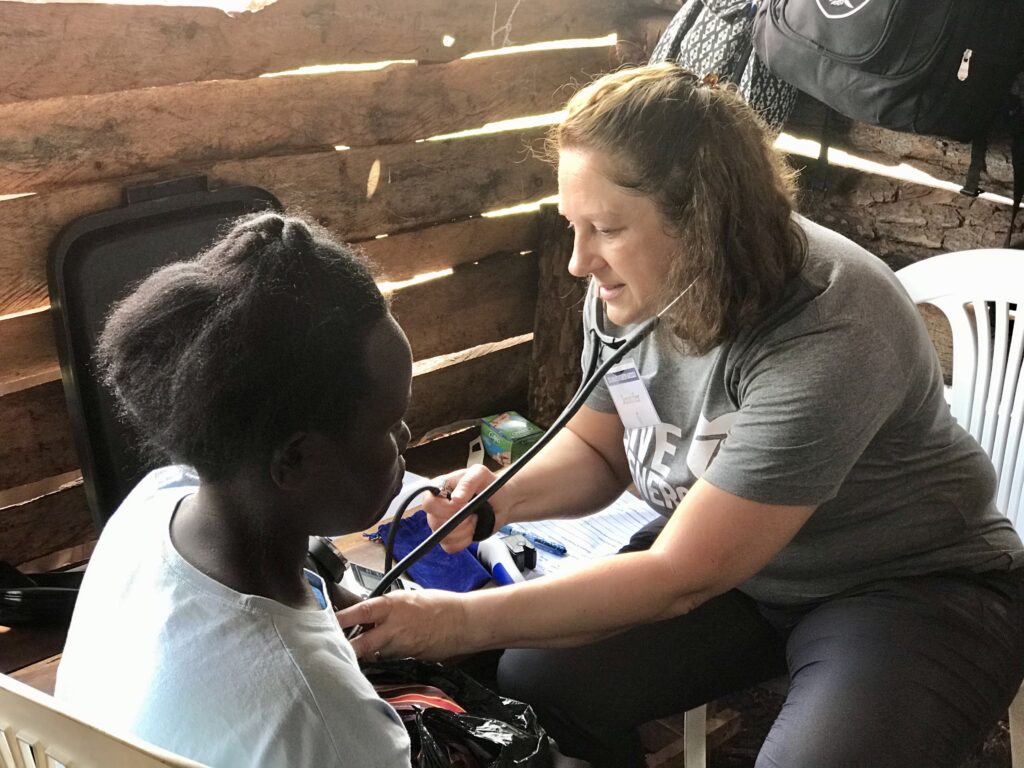
Consider this hypothetical example:
Volunteer Valerie wants to serve at one of The Lutheran Church—Missouri Synod’s Project 24 sites in Kenya. Project 24 sites are in isolated areas, far from cities.
Typically, short-term volunteers at Project 24 sites live in the same conditions as the students they are serving. They sleep in a small guest area, take sponge baths, and eat the same food the students eat.
Volunteer Valerie has a corn allergy. She breaks out in hives any time she accidentally eats it. Corn is one of the staple foods for the Project 24 sites.
If Volunteer Valerie accidentally ate something that had corn and it triggered an allergic reaction, it might require medical attention. However, in Kenya that would require a long drive down poor roads, just to reach a local medical provider.
However, if Volunteer Valerie served in Poland, she would probably not encounter any issues. It would be relatively easy to avoid corn. And if she did accidentally eat something with corn in it, access to medical care is much easier in Poland than in Kenya.
We ask all individuals serving with The Lutheran Church—Missouri Synod to consult with a primary care provider or travel physician prior to departing on a short-term mission trip. This is also a good practice for anyone planning to serve internationally with any host.
If your host organization is not prompting you to ask these questions, be proactive in inquiring about the physical requirements of your field of service.
Short-term mission trips include a large variety of service types and locations, whether domestic or international. However, international service is physically demanding in ways people don’t always expect.
Below are guidelines to share with your physician to determine if your current health is adequate for international travel and service.
General physical abilities
- Can you endure extreme weather temperatures or work conditions (e.g. hot and humid; super cold)?
- Can you walk 2 miles at a comfortable pace?
- Can you climb four flights of stairs without significant rest?
- Can you stand for at least two hours without sitting?
- Can you lift up to 40 pounds on occasion?
- Can you handle and lift your personal luggage?
- Can you quickly enter and exit a vehicle such as a bus or train?
Why this is important
If you answered NO to any of these questions, it’s important to have a conversation with your hosts about the exact physical demands of your location to be sure it is a good fit for you.
There may be ways to reduce the impact of the physical demands, or another location may be a better fit.
Either way, it’s an important conversation to have early in the process — before purchasing your plane tickets.
Health questions
- Do you have any unmanaged health conditions? If so, please talk with your doctor about how to address that health condition. Once you have a plan for that, then have a discussion about whether international service is advisable at this time.
- Do you have any chronic health conditions that are well managed? If so, have you discussed with your doctor the ways in which international service may impact your chronic health condition?
- Do you have any food allergies or sensitivities that might require a special diet?
- Do you have health care equipment that requires electricity (e.g. CPAP)? If so, do you have a battery backup? What would be the consequences if you were unable to use it at all?
- Do you have an adequate supply of all prescribed medication for the duration of the trip?
- Have you discussed with your doctor the Center for Disease Control recommended immunizations for your area of service? Are there any you are unable to get?
- Have you completed all immunizations required for entry by your destination country?
Why this is important
Different countries have different levels of health care infrastructure available. While every volunteer serving with the LCMS is placed on medical and emergency evacuation insurance coverage to assist in case of an emergency, it’s important to be proactive in avoiding potential difficulties.
Some locations are better equipped to respond to a flare up of a chronic health conditions or to accommodate a food allergy than others.
Again, none of the questions on this list would automatically bar you from serving, but it is important to consult with your doctor.
If your doctor thinks it is appropriate for you to serve in a country, then it is also important to consult with your hosts to make sure your needs can be accommodated in the exact location where you are serving.
The service of our volunteers is an important part of our international outreach!
We want you to be equipped to recognize the physical challenges that you might face so you can avoid life or health threatening situations. We will then be able to assist you in finding the best placement possible.